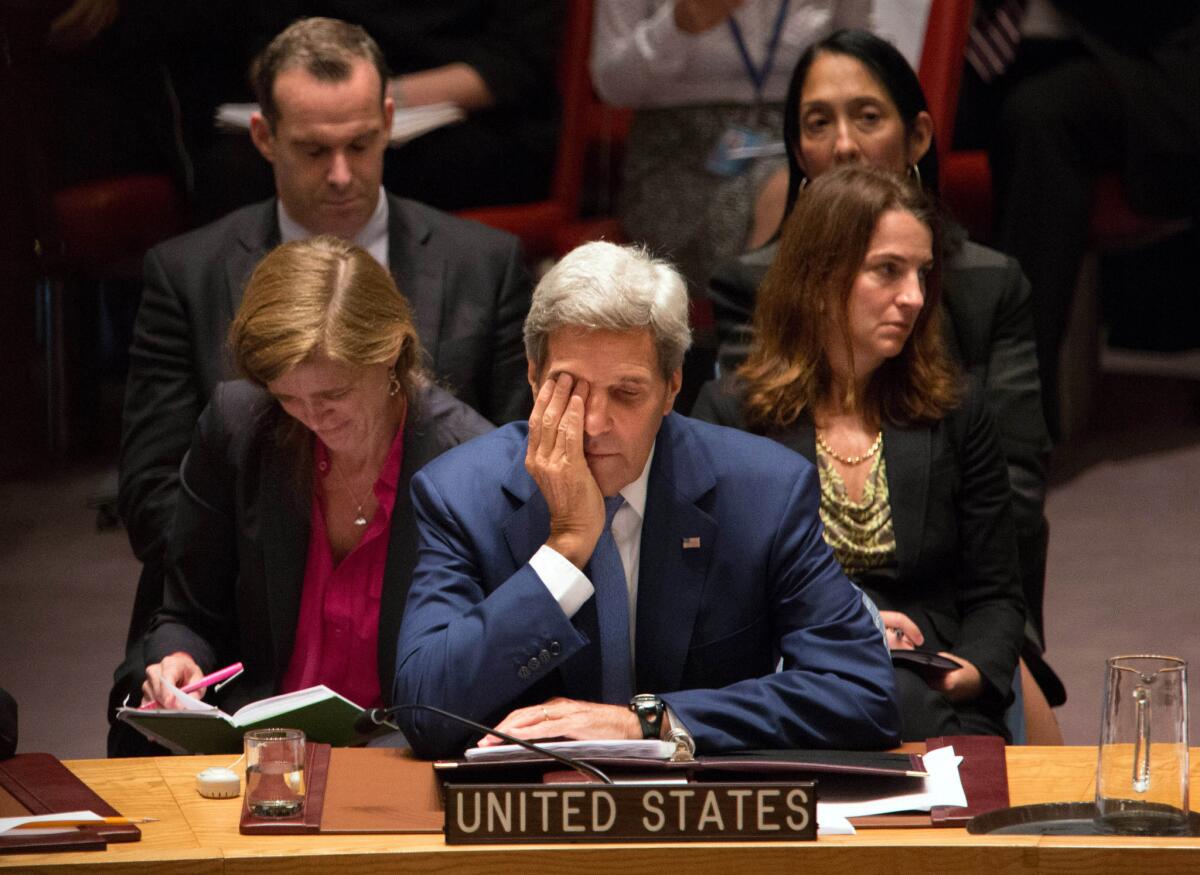Editorial: It’s time for change at the U.N. Security Council

U.S. Secretary of State John Kerry attends the United Nations Security Council on Sept. 30, 2015.
With the founding of the United Nations 70 years ago this month, the victors of World War II sought to position themselves as the protectors of peace and stability around the world. Their mechanism was the U.N. Security Council, which has since compiled an erratic record — operating first within the tensions of the Cold War, and more recently against a backdrop of competing national interests among the council’s five permanent members. Part of the problem is the way the U.N. charter structured the council, and the U.N. General Assembly took a small yet perhaps significant step when it voted last month to continue pushing for charter reforms that would change how the council works. That will be no easy task, but it needs to be done.
The Security Council has five permanent members — the United States, Great Britain, France, Russia and China — and 10 other nations elected to two-year terms by the 193 countries in the U.N.’s general membership. But the five permanent members, called the P5, wield significant power. If any one of them votes against a Security Council resolution, the measure fails.
Of the 193 measures vetoed by the Security Council since its founding, 163 were by a single country’s objection, 57 times by the U.S. and 96 times by Russia.
That veto power was intended to ensure concerted action: All five must agree before the council can move forward. In practice, though, this has meant each of the P5 has been able to block Security Council actions against client states and allies, and forestall condemnation and sanctions against its own misdeeds. In recent years, Russia has stopped moves against the Syrian government and in support of Ukraine, while the U.S. has vetoed measures targeting Israel. Of the 193 measures vetoed by the Security Council since its founding, 163 were by a single country’s objection, 57 times by the U.S. and 96 times by Russia. How to reduce the power of individual permanent members is the trick. Require two no votes to stop a measure? It’s an idea worth considering.
A more fundamental problem is that the composition of the P5 reflects the world dynamic at the war’s end in 1945. But that balance of economic and political power has changed significantly. The Soviet Union has disintegrated — its seat is now held by the Russian Federation — and China’s nationalist government was toppled by the communist regime four years after the U.N. was founded. Meanwhile, vanquished nations Germany and Japan have rebounded as leading economic powers, along with developing nations India and Brazil, all of which have pressed for permanent status on the Security Council.
Whether those nations, or others such as South Africa, get such status, and whether permanent members should retain their individual veto, are delicate and difficult questions, in part because each of the P5 would have to agree to cede power, which doesn’t seem likely (the U.S. and Russia seem particularly resistant). But as former U.N. Secretary-General Kofi Annan argued recently, the Security Council risks losing relevance if it doesn’t adapt. And that could make an already unstable world even more dangerous.
Follow the Opinion section on Twitter @latimesopinion and Facebook
More to Read
A cure for the common opinion
Get thought-provoking perspectives with our weekly newsletter.
You may occasionally receive promotional content from the Los Angeles Times.






